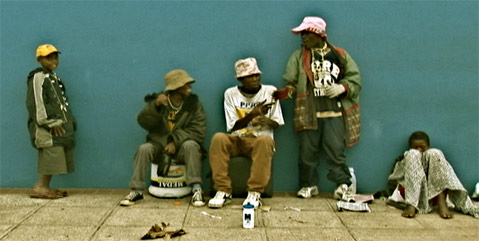Angels in Exile
Director Billy Raftery

Following glue-huffing street kids of Durban, South Africa, for nearly a decade, this shows the steady downs of childhood abuse, knife fights, drug dealing, HIV, and police oppression with the very rare ups of when social outreach programs actually work against those odds.
Narrated by actress Charlize Theron, Angels in Exile investigates why these kids are on the streets, examines what their daily and nightly lives are like, and presents a sociological snapshot of otherwise forgotten beings. It’s as heavy as documentary filmmaking gets, so I’d recommend bringing some tissues.
Director Billy Raftery recently answered some questions via email.
This is the result of years of filming. At which point did you realize that this should be a feature-length documentary?
I never thought it would be anything but a feature documentary but that’s largely due to a blessing of being young and naive!
I was visiting South Africa to do a surf trip with a close friend I grew up with in Jersey and was introduced to the homeless children back in 2003. I knew of such problems at home but never saw it so visible and graphic — they really took the issue to another level. I knew I had to film the kids or help them in some capacity once I graduated.
Fortunately, my early 20s provided me with the inexperience needed to take on such a task, and blindly at that. I really thought it would take a year of filming and perhaps a year of editing to wrap up the doc and have it running the festival circuit. Little did I know!
How many kids did you have to follow to narrow in on the sagas of Zulieka and Ariel?
Ariel was actually one of the first kids I befriended on the streets. He spoke fluent English while most of the kids speak primarily Zulu, so he was a perfect entry point (not to mention a total character with a wise crack for just about everything that came out of my mouth) to the majority of the kids that live in the infamous Point Road district. I knew he would be a great focal point for our “boys” side of street life.
But as time passed I was eagerly looking to meet the right girl to represent this overlooked population. Most of the girls, being targets for sexual abuse and prostitution, typically steer clear of men in general. However, one day we were making the rounds to get food to the kids, play some basketball, and finish with a surf (on an ideal and rarely uninterrupted day). We stopped at the Victoria Embankment (a section that’s part of the Point Road area) and that’s when I met Zuleika. She was about 11 at the time (and looked about 8). I was blown away by her laugh, energy and charisma…so happy with nothing. Her kind disposition, innocence and humor told me she would be a perfect representation for the girls on the street. This was exactly on the tape that denoted our 52nd (of 200+) hour of footage.
As we dug deeper during interviews, it became clear she encompassed all the horrors too many girls face on the daily. This highlighted the idea of Zuleika telling the story from a girl’s perspective. She and Ariel were beyond courageous to be a part of our film. And for that, they have told a story that not only represents the issue of homeless youth in South Africa, but for the global issue at hand.
How many kids just vanished or died?
Kids that I grew close to disappeared all the time. Not every day but close to once a month. That’s a lot. Between Durban having the largest port in Africa making it a hub for sexual trafficking and the constant knife and gun violence on the streets along with perpetual hit and run accidents, kids would often vanish or die.
I have many specific and personal stories of kids being hit by cars, trucks, or buses as well as stabbed or shot to death. It’s largely unavoidable due the inherent ills of the streets, and for those who live through a day, they have an escalating risk the longer they spend time on the streets.
How does the everyday Durban resident treat these kids? Just ignore them?
Exactly. Based on my experience, it takes a unique South African to embrace these children. The norm is to ignore them or torment them to scare them out of certain neighborhoods that they begin to live in around the city. They are quite nomadic in that they are always not welcome and forced to move.
The way in which most South Africans deal with street children is certainly effected by the media that always refers to them as if they were animals. You pick up a local paper and you’ll see write ups with headlines along the lines of “Street Kids Hunt In Packs” or “Street Kids See Tourists as Prey”.
The media and authorities also love to use the street children as scapegoats for serious crime or unknown and elusive violators. I am not saying the kids don’t engage in criminal activity because they most certainly do. However, it is usually petty theft or drugs, not murder or raping of tourists.
For example, when I was living in Durban, a street kid was locked up for years as they slapped him with raping a French tourist. This was terrible media for South Africa and devastating international news. Instead of finding the sexually demented assailant who was identified as an adult, they grabbed a group of street children, blaming one for being the ring leader. Case closed to the authorities. These are the kid of stories you hear about all the time.
Huffing glue seems to be a horrible way to get high. Is there anything being done by the authorities to counteract that trend?
Umthombo Organization has a thorough process of getting children off of glue through working hand-in-hand with local rehabilitation care providers or weening them off by introducing them to programs such as surfing where many of the children find a passion and never want to go back to huffing.
Did you have any trouble shooting this film? Violence or threats against you? Government interference?
We were shot at three times during our “violence” section of the film. That was an intense evening! I’ve also had a few knives put up to me, mugged, you name it. I would wake up every morning around 6 a.m. for a surf and look out at the ocean asking God to please give me one more day. I am not trying to melodramatic, but that was the mental state of mine when living in Durban and the work our organizations do.
Angels in Exile screens on Fri., Jan. 25, 2 p.m, and Sun., Jan. 27, 8:30 a.m., both times at the Metro 4. See act4entertainment.com/projects/angels-in-exile.



